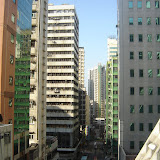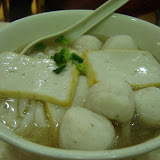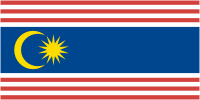MCCBCHST representatives meet Deputy British High Commissioner
There is a worrying downward trend in inter-ethnic and inter-faith relations in the country, said a spokesman of the MCCBCHST EXCO at a recent meeting between representatives of the MCCBCHST and the Deputy British High Commissioner of Malaysia, Mr. Patrick Moody.
How can Malaysia be a model for dialogue as stated by Mr. John Prescott, the DPM of U.K. when he visited Malaysia recently, another added.
Other religious representatives present also added their voices to concern of minority religious communities in Malaysia.
Mr. Moody, in his response assured the people present that the British government monitors very carefully the political developments in the country. When our DPM Mr. Prescott visited Malaysia, the interfaith relation was not the single issue of his visit. said Patrick Moody.
However, as a plural society, Malaysia has managed to retain political stability and to a considerable extent, its social cohesion, he emphasized.
He is following very closely, the different ways the Federal Constitution is being interpreted, and in some ways threatening the delicate balance that holds the country together.
He agreed with the MCCBCHST that dialogue between all parties in interfaith relations is crucial. The more people are not talking together, the more they shall be talking against each other, he went on to say.
He informed the MCCBCHST that the U.K. government encourages British Muslims with moderate views to visit Malaysia and share their experiences. One or two of such visits in the past have proven to be useful in the on-going dialogue process.
The meeting ended by MCCBCHST calling on the Deputy High Commissioner to organize occasional dialogue sessions so that the views of all religious communities in Malaysia will be taken into account. Such views should be communicated to visiting dignitaries of the U.K. government in the future.
The CFM EXCO was represented at that meeting by Rev. Thomas Philips, Rev. Dr. Hermen Shastri and Mr. Leonard Teoh.
Discussion Calendar
- Jan06 Depart SFO
- Jan07 JK & MT
- Jan08 Kelly: LGBT/Prog. mvmts
- Jan09 Emily: Globalization/sex trafficking
- Jan10 Susie: Islamic symbols/rituals
- Jan11 Gary: Interreligious dialogue
- Jan12 Abby: Neocolonialism
- Jan13 Hoang-Anh: Tourism
- Jan14 (Worship) Alan: Missionary mvmts
- Jan15 JK & MT
- Jan16 Candis: Youth/leadership/resistance & hope
- Jan17 Amy & Melissa: Amerasian/children
- Jan18 Pat: Indigenous symbols/rituals
- Jan19 Theresa: Theologies of hope
- Jan20 JK, MT, Ginny
- Jan21 Return to SFO
Course Description
While Vietnam and Malaysia are both post-colonial Southeast Asian nations with a long history of colonial domination, they have very distinctive socio-cultural, political, and religious realities. This travel seminar seeks to introduce participants to the religious landscapes in these two distinctive contexts. Attention will also be given to the study of theology in Malaysia and Vietnam. There will also be short visits to theological institutions & sight-seeing opportunities in Hong Kong and Singapore. The seminar counts as a contextual learning course for PSR M.Div. students by providing experiences for cross-cultural and multi-relgious encounters and exchanges, as well as immersion in the cultures and everyday life of peoples and local communities in the regions which we will be visiting.
In this seminar, participants will:
- 1. Visit a number of theological and religious institutions located in Hong Kong, Singapore, Malaysia, and Vietnam—including Protestant and Catholic seminaries, Buddhist temples and pagodas, Muslim mosques, Hindu temples;
- 2. Visit vestiges and sites of cultural and political significance—for example, the Chi Lin Nunnery and Fish Gate in Hong Kong; the Haw Par Villa, Lit-tle India, and Kampong Glam in Singapore; A Famosa, Batu Caves, and Dataran Merdeka in Malaysia; the Cu Chi tunnels, Vinh Nghiem Pagoda, Thap Ba Ponagar, Dam Market, Thap Cham Phan Rang of Vietnam;
- 3. Engage in dialogue with seminary faculty & students, religious leaders, and community activists to gain insights on the cultural and religious landscapes of Malaysia and Vietnam for the understanding of the negotia-tions between religion and state under the ideologies of “rukunegara” (Malaysia’s Principles of Nationhood) and “doi moi” (Vietnam’s economic reform policy);
- 4. Read selected articles, research web resources, and do additional research necessary to gain knowledge on a particular issue of their choice related to any of the themes presented in the course description;
- 5. Learn what it takes to cultivate a disposition of receptivity and reflexivity for engaging cultural and religious “otherness”; and the importance of re-flecting on one’s social location for critical social analysis and theological construction that takes seriously context and partnerships with communi-ties;
- 6. Engage in self-critical reflection, connecting the personal to social, one’s own social location with the cultural-religious contexts of others; and ar-ticulate how this immersion contributes to one’s formation as a religious leader in one’s future context(s).










No comments:
Post a Comment